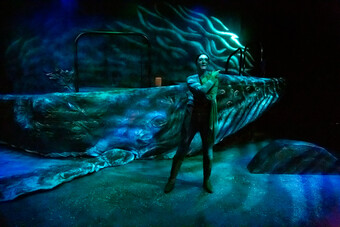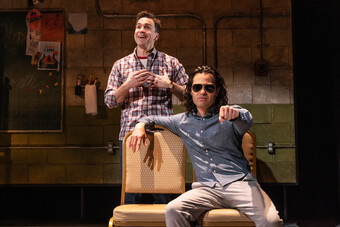The Title of the Play
Does it Matter?
Finding a title for anything is difficult. Once you title a play, a movie, a show, even a band, it automatically becomes a part of the product’s identity. It’s impossible for us not to judge a book by it’s cover, though often we pretend that we are far too sophisticated to pick up a book based on its design—more often that not, we do. In the case of covers, there are countless articles discussing the psychology of color in marketing. In case you’re interested, the most popular color by far today is yellow. Yellow stimulates the logical life of the brain apparently, promotes clarity and inspires creative ideas. Yellow helps with decision making and will hopefully influence the reader to purchase the book.
Titles work in the same way.
I used to spend so much time worrying about the titles of my plays. The first title of my play is always the first Save As title. That’s the title I give a play when my computer tells me it’s time to save the document as something. It normally happens around fourteen pages in and it takes me less than ten seconds to write something into the box. Then I click the Save button straight away without considering what that title is. I often don’t remember what I have called the play until I finish that writing session and realize I need to know where it is in my computer.
I am a hard worker, I write a lot, and yet, I can often be quite lazy. That title, that first Save As title, never changes.
I am currently a part of a writers group and one of four MFA candidates in playwriting at Fordham University. This subject of title comes up a lot. Not during workshop, but almost always just before the playwright has a marketing conversation, or is about to jump into a production. We discuss the doubts about the “Working Title”—there are insecurities about what the title says and how it influences the reading of the play. Then there is the poster and flyer. How will the title look in print? What will the image be that accompanies the title… Maybe if I change the title we can get a better image, a better poster, people will come… The worry goes on and on.
There are titles that I love and there are titles that I hate. Hate is a strong word, but I mean it. The distaste for the title, though, rarely influences my reading of the play or my enjoyment of the production. That is, until it is quoted by an actor in the play…
Movies are the worst perpetrators of this. Having trailed the internet, I have found quite an array of offenders (thank you Nerdist.com for the great compilation). Here are a few that are the most offensive to my ear: Face Off, Eternal Sunshine of The Spotless Mind, The Fifth Element, Girl Interrupted. Imagine it, you’re enjoying the film, and then the lead character mutters the title, transporting you out of the world of celluloid and onto the front cover. Now, I should say, I don’t mind it when the title describes an object, a place, an event or a person. But when I have to hear I Bought A Zoo three times in a film about a man who buys a zoo? It drives me nuts.
Constant Gardener was recently voted one of the top 25 worst titles of all time (see complexpopculture.com), and it sits amongst some of the greatest titled turkeys of all time; The West Really is Fun, Santa with Muscles, and Mother May I Sleep with Danger. I don’t get it. I love the title of the Constant Gardner. It’s cerebral, smart and a great crystallization of the protagonist’s state of being in the film. And when I see the cover, the branding if you will, I don’t think to myself, “Oh great, the story of a man who is obsessed with his English Garden, if we’re lucky there might be poppies.” No, quite the contrary, I am intrigued by the juxtaposition of the image with the title and I want to know more. What is in-between the title and the image? What lies within the unknowingness of the collage? What sits within the Pinteresque pause created in the void? In defense of Eternal Sunshine of the Spotless Mind—this is another title that I would have simply adored, had they not said it in a voice over that feels like a producers afterthought, in what was a thoroughly smart movie.
I fear that by embracing the quick fix of clicking to rent, like, and own, producers feel the need to convey as much information as possible in a title. The need to click weighs far greater than the need to explore.
In a time when theater (I speak from NYC) is everywhere, there is certainly the feeling that we must do as much as we can to promote our work, and if changing the title helps, then why not change it.
A secret from me. The title is so very important. Not because of sale figures, but to the playwright.
Something that struck me this week as I closed a studio production at Fordham University was the fact that no one came up to me and asked me what the title meant. The play is a living room drama, a one-act comedy/drama about a washed out actress and her husband. Ultimately we discover that her husband is gay, and suffering from MS. Margo (the wife) decides to invite his ex-lover (and family friend) to dinner, and allow John (the husband) to continue with the affair; she makes a huge sacrifice for his happiness. All of this is revealed to the audience without the characters having any discussion about the matter. The play was called Fit For A King.
When I first presented the play to a friend, her comment was: you have to explain what you mean by that, you can’t expect everyone to understand your idea behind the title—and within this flap she also said—I mean, how do you convey what it’s about on the flyer?
Truth is I didn’t care. The title is a crystallization of a very old English attitude, and if you don’t get it, then that’s fine. If you do, then you can chuckle a little. It shouldn’t have any impact on the enjoyment of the piece at all. In fact, my aim was for the title to reflect the story once the play was over, and I think it does that well. I love puzzles. I also feel the title represents the content well. It suggests a few ideas: opulence, class, and England. That is fine by me. I don’t need to give any more away.
So this brings me back to the Save As title. Fit For a King was my Save As title. All of my plays, apart from one, live and enjoy their Save As title. The one Save As title that didn’t survive? I regret it to this day. The title I ended up with feels foreign and incorrect; the truth of the play is not reflected in the title, and it’s because it’s not mine. It’s a product of worry, overthinking, marketing, and the opinions of others. I went as far as sending out a doodle poll to those who knew the play for their opinion—such a stupid idea. That play sits uncomfortably on my shelf, wearing the wrong coat, trying to be something it’s not. I will never do this again.
And to that end, I wonder… Does my play choose the title, or does that first title inform my play? At fourteen pages in, who knows what will happen to these characters? Who knows what will happen in this world? I am not a writer who plots anything out, it’s all just spewing when it comes to the first draft, tweaking in the second, and figuring it out structurally from then on.
I love being a playwright. It’s often hard, financially unrewarding, and jading, but I love it. The main reason I write plays is so that I can answer questions I may be afraid to ask. I like to find new perspectives on the reasons we do things, on why I do things, and why others have done things to me. There is always a core question in my plays, but I don’t always know what they are until I’m more than half way done with the second draft, or in workshop. Sometimes I don’t know what the question is until I see it on it’s feet, and that, my friend, is a strange and wonderful experience. It hits you over the head like a wet fish and you think—Oh finally, now I know why I wrote this crazy thing, and you can move on.
Whenever the question becomes clear, I smile a little, because my title seemed to know it all along.












Comments
The article is just the start of the conversation—we want to know what you think about this subject, too! HowlRound is a space for knowledge-sharing, and we welcome spirited, thoughtful, and on-topic dialogue. Find our full comments policy here
Thanks for the thoughtful discussion about titles as a way to consider playwriting's role on a larger scale. I often worry about titles, too, but I have a different relationship with my "Save As" titles. I don't hold on to them in the same way, but they are definitely there for me as an important and essential part of the process even if they aren't meant to be associated with the final product.
I was recently in a conversation where someone said "I wish there were theatre police." Someone else responded "No - we don't need theatre police. But we do need TITLE police - I mean, most titles are fine, but some of them are just AWFUL and ruin both the marketing and the play itself."
I totally get that complaint. Both research and anecdotal experience show us that audience expectation have a huge impact on how much they enjoy a particular theatrical experience. If you name a show 'Laughing your Butt off in the Land of Comedy' and someone shows up expecting a farce, and then the show opens with a woman pining for the loss of her dead children (something like this did, in fact, happen to me), it's terribly jarring and gets the whole experience off on the wrong foot.
The only thing worse than deliberately misleading titles are those where this-title-is-so-long-that-it-won't-fit-on-a-marquee-but-that's-ok-because-i-want-to-be-pretentious-and-misleading-at-the-same-time. Those long titles become completely opaque, confusing, and open themselves up to unintended shorthand for theatre staff and audiences alike. For example, the wonderful production of 'We are proud to present a presentation about the herero of namibia' is a really great show, but everywhere I've seen it referred to, it's immediately reduced to 'We are Proud to Present...', which is COMPLETELY MEANINGLESS. That's the filler text at the top of a program, before you see the title. Is there a reason it couldn't have just been called 'The Herero of Namibia'?
And don't even get me started on the full production of the play called 'A Public Reading of an Unproduced Screenplay About the Death of Walt Disney'. You can almost hear the marketing directors throwing themselves out of high windows over that one. Could a title be more confusing?
Titles are hugely important, as they communicate to everyone what they should expect when they engage with this piece of art - and if they're confusing or misleading, or just annoying, then they are sabotaging the rest of work the playwright and all the other artists are putting into the work.
Intriguing, great. Mysterious, great. Puzzling, sure. But a title is a communication tool, and whoever is choosing the titles (playwright, producer, publisher, whoever) need to remember that.
Yes, there is certainly a line, and I too am not a big fan of the long titles - purely because shortening the title is not what the playwright intended either, so the play ends up with the wrong title anyway. What a mess.
I feel like the long title requires further conversation. I wonder if we can reach out to a playwright that has a long title and ask what the motivation behind it was, and continue with this conversation. I'm certain that wasn't the Save As title, so I wonder what the thought process was behind it.
Long titles are olde-timey. My personal favorite is "The Persecution and Assassination of Jean-Paul Marat as Performed by the Inmates of the Asylum of Charenton Under the Direction of the Marquis de Sade."
Great article. Please write more of 'em!